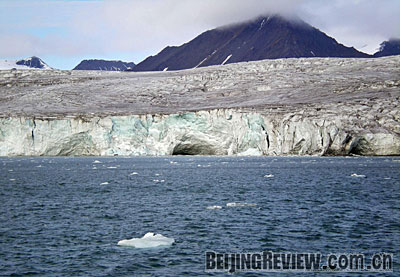|

MELTING AWAY: The photo shows the melting Esmark glacier in the Norwegian Arctic archipelago of Svalbard on August 23, 2007. The glacier has shrunk by 3.5 km since 1966. Scientific research shows that temperatures in the Arctic region are rising twice as fast as elsewhere on the planet (XINHUA/AFP)
Scientists have long warned that global warming is a growing threat. Now international observers are concerned that the natural resources in the Arctic region-made more accessible by rising temperatures-could lead to conflict between countries eager to exploit them.
This previously tranquil and peaceful polar area has become crowded with treasure-hunting exploration teams from different countries. International studies experts point out the need for established principles governing Arctic exploration to prevent abuse and head off international conflict.
Treasure island
The Arctic refers to the wide region around the North Pole, which includes the Arctic Ocean and parts of eight countries and territories. Abundant resources, including natural gas, oil, aquatic products and mineral resources, are stored underground and have until now remained largely untouched.
According to a U.S. Geological Survey (USGS) report issued on July 23, the area north of the Arctic Circle has an estimated 90 billion barrels of undiscovered, technically recoverable oil, 1,670 trillion cubic feet of natural gas and 44 billion barrels of natural gas liquids.
These resources account for about 22 percent of the undiscovered, technically recoverable resources in the world. The Arctic has about 13 percent of the world's undiscovered oil, 30 percent of undiscovered natural gas and 20 percent of undiscovered natural gas liquids. According to the report, about 84 percent of these resources are located offshore.
The report values the Arctic's oil and natural gas resources at about $30 trillion, which is equal to the combined 2007 gross national products of the United States, Japan, China, Germany and Britain.
In addition, the Arctic has millions of tons of zinc, lead, diamond and gold reserves, as well as fishery reserves.
Another Arctic draw is the fabled Northwest Passage, a sea route connecting the Atlantic and Pacific oceans. The melting Arctic ice cap opens it up more each year. The Intergovernmental Panel on Climate Change (IPCC) recently issued a report saying that, as Arctic temperatures rise, so will the route's economic value.
A Xinhua report said that if icebergs in the Arctic Ocean continue melting at their current speed of 3 percent a year, 10 years from now the Northwest Passage will be open for at least one month in the summer. By 2080, or even as early as 2050, the passage will be completely ice-free. Compared to the Panama Canal, the Northwest Passage would shorten the voyage between North America and Asia by 6,500 km and the Europe-Asia route by 3,990 km. In addition to lowering commercial costs, an open passage would also have military and strategic value.
Now, competing sovereignty claims among the eight Arctic-attached countries-Canada, Russia, Norway, Sweden, Finland, Iceland, Denmark and the United States-have led governments to become more aggressive. Russian daily newspaper Komsomolskaya Pravda published an article on May 4 saying that Arctic issues are most likely to be the reason behind a third world war.
Canada considers the Arctic its own backyard. Canadian Prime Minister Stephen Harper declared on August 26 that Canada would invest $100 million over five years to map its energy and mineral resources in the Arctic as preparation for later exploration. "Use it or lose it is the first principle of Arctic sovereignty," Harper said.
| 